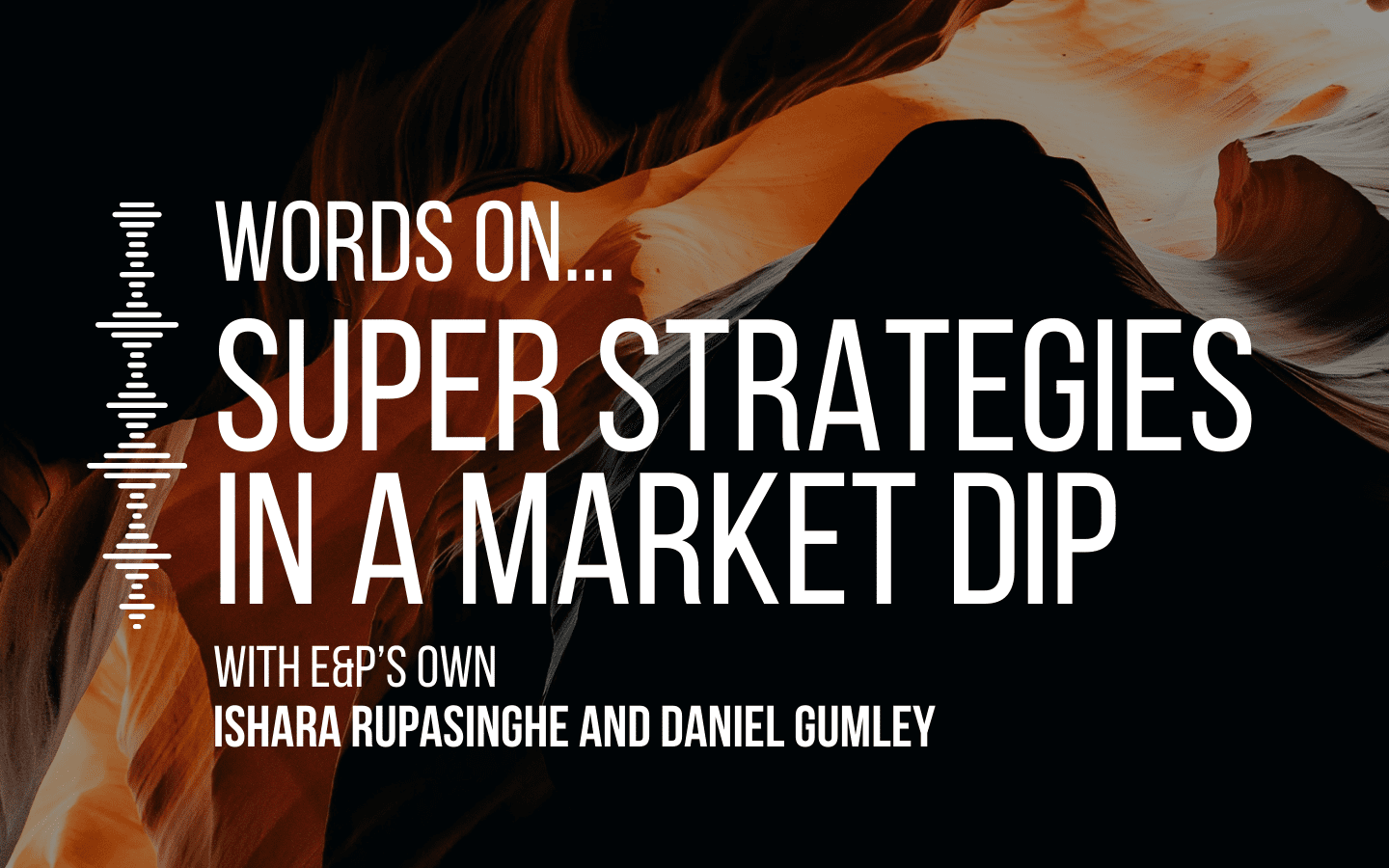


Words on what’s to come
Introduction
Welcome to Words on Wealth, a podcast by Evans and Partners that unpacks the key trends and opportunities shaping markets, the economy and your financial well-being. Join us as we make sense of the issues that matter most to you.
Lucy Meagher
Welcome to the Words on Wealth podcast. My name is Lucy Meagher. I’m a director and senior investment advisor at Evans & Partners. And I’m your host for today as we delve into the outlook for financial markets in 2025. Joining me today for this discussion, we have a bit of a crew. We’ve got our chief investment officer, Tim Rocks, joining us. We also have our two independent members on the investment committee at Evans & Partners. So, we have Honor McFadyen. Honor is our independent chair and has a long history in financial markets. Most recently, she was managing director and head of debt capital markets at Deutsche Bank. And we also have Anne Anderson. So, Anne is our other independent member of the investment committee, also a very experienced financial professional. Most recently, Anne was managing director and head of fixed income and investment solutions at UBS. You know, we have a wealth of experience here as we look to discuss the outlook into 2025. Look, before we get into it, I thought given that we are, you know, three members on the Investment Committee, I thought it might be worth revisiting for our listeners, you know, the function of the Investment Committee and how it is that it helps Evans and Partners clients. So, Honor, as Chair, would you like to tell us a little bit about the Investment Committee?
Honor McFadyen
Thank you, Lucy. And look, as you mentioned, there’s two independent members, myself as independent chair and Anne Anderson as an independent NED. And then we have our CIO, Tim Rocks, our head of research, Cam McDonald, and our head of PRG, which is Andy Moir. So we have five voting members. And practically we meet, will be eight times a year to make sure that we prosecute our investment views for our strategic asset allocation. most importantly, it’s actually a governance role. So we provide guidance and oversight to our EMP board. We maintain a robust investment framework that seeks to maximise client returns, ex fees, subject, of course, to a sort of a level, an appropriate level of risk. We monitor and manage investment risks. So, our market access team ensures that we have really good reporting to highlight any potential risks. We have been focusing on our performance monitoring. And again, we have a very adept team that ensures that our performance in terms of our strategic asset allocation and our tactical asset allocation is reviewed and prosecuted, I would say. And we also now have the ability to look at our client portfolio performance, and that’s going to be really a key focus of us in the coming 12 months. So really in essence, the IC basically safeguards the integrity and the effectiveness of EMP’s investment strategies, ensuring that they deliver value and security to the clients.
Lucy Meagher
Thanks, Honour. Yeah, value and security. Very, very important points for our clients. So with that background, Tim, I might hand it over to you and we’ll look at the year ahead. So what are your thoughts on the overall macro picture for 2025?
Tim Rocks
Thanks, Lucy. We think it looks pretty solid, which is good to know. We’ve spent the last couple of years, or the whole macro community, worrying about things that could go wrong. And there were a lot of big picture kind of issues that we were dealing with. Inflation, rising interest rates, concern about the Chinese property market, some geopolitical tensions. And all of those issues seem to be a little less front of mind now. And in fact, some of them have reversed. Inflation is clearly reversed. Interest rates are going down. And we do think that sets up for a pretty decent year into 2025. If we look quickly at the main regions, the US is probably still going to be the dominant engine of that growth. And in fact, with falling interest rates and a bit of a confidence bounce from Trump, maybe some extra fiscal stimulus, that does look as though it’s going to carry the world again. We’re expecting about the same from China as it delivered this year. As I said, the risks around property have been front and centre for some time, but there has been some recent encouraging signs of stabilisation, as well as a clear government commitment to trying to simulate that economy more, which I think is very important. Yeah, so that’s that global backdrop. And I think that translates through to Australia too. Australia has been definitely a muddle through. It has not been an easy economic period. We have been particularly affected by higher interest rates and those cost of living problems, but we have muddled through until now. And I actually think there’s some chance that 25 looks a little bit better. Whether that’s true or not will depend on consumer spending. Consumer spending has been pretty desperately weak really for a couple of years. But as far as we can see, all the preconditions are in place for some increase in spending. You’ve had tax cuts, the cost of living crisis is somewhat over. There’s some chance of falling interest rates. Wealth is better. So, we’ll wait and see. And obviously the Christmas period is always very important for consumer spending. Overall, I have some hope that the Aussie economy also is some kind of contributor to a better outlook in 2025.
Lucy Meagher
Thanks, Tim. That positive read is certainly reassuring. And I understand one of the functions of the investment committee is certainly to debate these ideas as we come to our strategic asset allocation decision. So, I mean, Honour, do you agree with what Tim said or are there any risks to this view?
Honor McFadyen
I actually absolutely concur with Tim’s view. And I think it’s interesting because I come from a fixed income background. So I’m sort of more naturally inclined to be a little more conservative, but that’s important for the whole makeup of the committee, actually. So we can actually have these debates. And I think, as Tim said, that the key risk from that baseline scenario is if inflation actually ticks up or definitely ticks up and then what those implications are for interest rates, whether that actually means they can go higher or stay here for longer. So what can cause inflation to tick up? Well, obviously, you know, a full Trump scenario, we’re all reading as much as we can about what the implications are on tariffs, whether he will actually deliver what he’s threatening to deliver. They could be two very different things. So obviously that’s higher tariffs on China, on imports of autos into the US. So yes, the full blow on tariff ramification could lead to a higher inflation globally. The implications for immigration, Tim’s just touched on that. But again, we really do need to give Trump some time to see what he actually means by those threats and any government disruption. I mean, that again could be somewhat inflationary. Another risk might be, as Tim just touched on, is a Chinese financial crisis. They’ve announced some more fiscal easing. So, I think they’re already preempting potentially Trump coming in to offset that. And well, the Middle East tensions, I think they’ve been around for the last 12 months. There’s been some developments with Syria, obviously, over the weekend. So that could be a disruption to the Iranian oil supply and that will lead to higher inflation. But again, that’s probably been around for the last 12 months, those geopolitical risks.
Lucy Meagher
Anne if I come to you now, you obviously, you know, your background is in fixed income also. So what about your views on the outlook for inflation and interest rates next year?
Anne Andersen
Thanks Lucy. Yeah, so as Honor indicated, inflation remains one of the biggest risks and pleasingly it looks like it has moderated and the big question is whether that will continue to be the case. And the inflation that we saw, the spike over the past couple of years that prompted much tighter monetary policy settings, has largely moved through as the unique combination of shocks, the supply disruptions relating to COVID, the demand that increased post pandemic, the rise in commodity prices. Most of that has worked through the system and consequently we’re seeing most countries with the exception of Australia starting their easing cycle. I think the big thing is services inflation remains elevated and the play with the US tariffs that we’ve already touched on, that’s essentially a tax on importers in the US and the US drives a lot of financial market pricing. So, it is important to have a view on this and I think the big risk here is that this tax on importers will be passed on to consumers. So, the double-edged sword of having a healthy consumer, which is great, may make them less sensitive to increased prices as, for example, most estimates I’ve seen see a 4 % increase in prices as a result of these tariffs. It’s hard to model, but let’s say that. Consumers might just accept that and producers can take advantage of a healthy consumer. So, we get baked in much higher inflation. So, the forecast for inflation into next year including in Australia moving down into the lower three and for example in Australia and the US back in the band so we’re looking at the mid twos, and then our RBA can be easing when that’s assured. So that’s the risk that inflation pulls up in the three, depending on how things play out and that will arrest the nice easing in policy that’s underpinning this more positive outlook into next year. So I’m not saying it’s a base case, but it’s definitely something that we are thinking about. So, you know, we retain the positive view, but should we see inflation pull up in the threes, it means that we will continue to see a much steeper yield curve. That is, that the shorter maturity securities will be lower, but we’ll still see much higher long-term interest rates.
Lucy Meagher
Okay. So, if we take all of those elements that we’ve discussed, Tim, you know, your team and the chief investment office, you know, are you thinking about any major changes to portfolio recommendations, factoring all of that in?
Tim Rocks
Yeah, thanks, Lucy. Look, overall, we see it as a pretty good investment environment. If you take into account the two key takeaways from that outlook, which is number one, interest rates generally pretty high for longer. So that’s good for the interest rate part of your portfolio, you’re still going to make decent returns on that six, seven, eight, 9%, depending on what the level of risk you’re taking on. So good to that part of the portfolio. But then also, earnings should be strong on the back of the economic outlook, which should support equities as well. So those two key parts of your portfolio should be supported. What we would say though on equities is that a lot is priced in to markets. Valuations have generally gone higher in key parts of the market over the last couple of years. So, we are wary of being a little bit more selective, both in our international equity positionings and in our local equity positionings. And just to highlight a couple of areas that we think are interesting. Offshore, it would be in the US small caps. So, we think we still want to stay relatively fully invested in offshore equities, but we would skew that more towards the lower end. Partly that’s because evaluations are better, but also because the whole Trump scenario of America first, of re-engineering of the domestic economy should be better for smaller companies. And so, we think they are more likely to benefit from that. So, US small caps, are number one offshore. And then domestically, obviously where markets been hitting record highs, that has meant some sectors have been dragged very high in valuations, but there’ve also been some laggards. And if I was going to call out one sector that has lagged, I think undeservedly, it would be the Aussie healthcare sector. So that’s one area we’ve actually got a new analyst in our team and he’s directing us towards some of the perhaps well-known companies, but some we do see as opportunities in the healthcare sector.
Lucy Meagher
That’s great. Okay. So we’re still seeing some opportunities despite, know, valuations on the whole being quite elevated. I suppose you addressed there, Tim, you know, looking at the fixed interest side and then also the equity side. But Honor, I might turn to you and ask about, you know, alternative assets. And just for the benefit of everyone on the call, by alternative assets, we mean things like private equity, hedge funds, alternative credits, that sort of space. What are the investment committees views on alternative assets at the moment?
Honor McFadyen
Thanks, Lucy. So look, we have been very positive alternative investments. And for the reasons that Tim has outlined, I mean, we spend many committee members debating about valuations of equity markets. And traditionally, bonds might have been viewed as a sort of a lowly correlated asset class with volatile equity, but lately, or it’s sort of in the more recent past, they’ve actually not behaved accordingly. So that possibly makes us more, I guess, encouraged to look at alternative investments. And under our SAA model, we have as much as or as high as 15 % of your portfolio allocated to alternate assets, as you outlined. And that includes, as you said, private debt, private unlisted infrastructure and property in an opportune sense. And what do we see within that sector? Well, look, we think there are sort of more inefficiencies within private markets. There’s illiquidity premiums and also the opportunity for active management. Private equity and debt have actually consistently outperformed the public market peers in recent times. And importantly, just given the theme of what we’ve been discussing today, which is inflation as a potential risk, they actually offer a real inflation hedge, particularly within infrastructure, real estate and potentially commodities. So they can actually preserve value in periods of high value. So we think it’s really important for diversification reasons to actually have some or more allocation toward ALTS. And, you know, our PRG team are spending a lot of time looking at managers and in particular global managers. So you might see a lot more opportunity for investing some of your portfolio with global managers in that space. So, and I think really what is interesting given we’ve outlined sort of our macro backdrop today, you know, within ALTS, performance of that asset class is actually dependent less on the macro themes and it’s more dependent on idiosyncratic returns. So again, just highlighting that diversification benefit of ALTS.
Lucy Meagher
Absolutely. And that PRG team that you mentioned, just to spell that out, that’s our product review group internally. So I sit on that. And the mandate of that group is to, as you say, provide due diligence on the scope of opportunities in managed product that we see and also keep vetting the opportunities that come across. just to set that one out a little bit further.
Honor McFadyen
And Lucy, are you seeing more opportunities with some within that sort of framework, more global managers coming through via private equity debt?
Lucy Meagher
Absolutely. So certainly on the private credit side, last 12 months, that has been an absolute hot pocket. There’s plenty of managers coming in and that just goes to the point of the added importance of having this due diligence function within our governance, because there will be a lot of private credit managers and not all of them are worth our investors and our clients’ money. So that due diligence function is very important, particularly when we see inflows into a space like private credit. Anne, I’ll come to you now again. I think if we go back to the bond market, you know, we’ve seen that it started worrying a little more about government debt sustainability and we’re seeing fiscal stimulus and debt really step out. Do you think we should be worried about these moves?
Anne Andersen
Well, we have this period of tight monetary policy and loose fiscal policies. And looking into the coming five, 10 years, it’s very important that those countries that have loosened their fiscal policy actually act to address the fiscal imbalances because whilst we’ve got a very optimistic outlook and the call to alternatives speaks to this diversification that Honor was just mentioning, building resilience into your portfolio because we are moving into a pretty uncertain time which will elevate volatility and this ongoing breaking down of the rules-based economy should not be underestimated in my opinion. And with the rise of stronger industrial unions and then these anti-competitive trade policies, it’s really quite important. So, countries such as the US, who had very healthy fiscal balance, have allowed it to deteriorate to, I’m referencing IMF figures in 2023, their general government debt as a share of GDP has gone to around 125%. Compare that to Japan at 250 and AUS is still around 50%. So, it really, the US has really shifted quite dramatically. Now, well you can see Japan, whilst it’s really high, their interest rates are still very low. So, it doesn’t matter until it does. And it really depends on what else is going on. So this debt sustainability concern seems to sort of ebb and flow in the markets. And for example, if the US has to continue to issue a lot of government debt, it will pressure interest rates and keep longer term interest rates higher. Pleasingly Australia is in a pretty good position relatively, globally. Sure, we’re seeing some deterioration at the state government level but a lot of that is around the building of infrastructure and renewable energy. So but it is important that the state governments do work to rein in and contain that debt because it can result in impact on the broader economic environment when they have to tighten, but also increases the risk. So I think Australia looks pretty good, Germany does, US is becoming a concern and it will really depend on the makeup of policies that are the incoming Trump regime instigates, together with just how the global diplomatic and relationships are playing out. You know, I don’t think it’s a near and present danger, but it’s something that is on the watch list.
Honor McFadyen
Tim, I just have a question on the back of what Anne was saying. For those investors that are just sitting out there wondering why, you know, we’re so concerned about bond vigilantes or bond market volatility. Why is that so important for, you know, the equity asset class, for example? Why do we care what bond markets say?
Tim Rocks
Well, most recently, the bond market brought down one UK premier, Liz Truss, effectively had to resign based on the bond market response. So they have a history. And then over time, I think this is the point you’re getting to on, know, there is a historically, there’s a strong correlation between the level of bond yields and valuations in the equity market. Now that doesn’t play out over short periods of time, but it is likely to play out over long periods of time. So, if the bond yield is going to be one or 2% higher and sustained at that level, eventually that is going to be a drag on equity valuations. yeah, bond markets are powerful. There’s no doubt they matter a lot. If bond yields do again go 2% higher, cost of servicing that debt from the US will be higher again. So it definitely matters. And I think as Anne highlighted, we don’t really know how or what time frame this risk will play out, but it’s definitely something we need to monitor constantly now.
Lucy Meagher
Thanks, Tim. Look, that’s been really great, everyone. Thank you. think if we take the general message from that is that we’re broadly optimistic looking into 2025. There’s obviously still selective opportunities on the equity side where we can see more uplift than the large caps. Then whilst at the same time being watching for the risks in potentially sticky inflation and therefore the trajectory of interest rates into 2025, but there’s enough for investors to be hopeful about as we look to the new year. Look, that is our last Words on Wealth podcast for the year. We’ll take a little break and we’ll be back on the 23rd of January with another episode. So in the meantime, we hope you all have a happy and safe holiday season and look forward to seeing you in the new year. Thanks everyone.
Disclaimer
This podcast was prepared by Evans and Partners Proprietary Limited AFSL number 318075. Any advice is general advice only and was prepared without taking into account your objectives, financial situation or needs. Before acting on any advice you should consider whether the advice is appropriate to you. Seeking professional personal advice is always highly recommended. Where this presentation refers to a particular financial product you should obtain a copy of the relevant PDS, TMD or offer document before making any investment decisions. Past investment performance is not a reliable indicator of future investment performance. Directors, employees, and officers at Evans & Partners, and its related entities, may have holdings in securities listed. Any taxation information is general and should only be used as a guide.
Tags
Disclaimer
This podcast was prepared by Evans and Partners Pty Limited AFSL 318075.
Any advice is general advice only and was prepared without taking into account your objectives, financial situation or needs. Before acting on any advice, you should consider whether the advice is appropriate to you. Seeking professional personal advice is always highly recommended. Where this presentation refers to a particular financial product, you should obtain a copy of the relevant PDS, TMD or offer document before making any investment decisions. Past performance is not a reliable indicator of future performance.
Directors, employees and officers of Evans and Partners and its related bodies corporate may have holdings in the securities discussed. Any taxation information is general and should only be used as a guide.
This communication is not intended to be a research report (as defined in ASIC Regulatory Guides 79 and 264). Any express or implicit opinion or recommendation about a named or readily identifiable investment product is merely a restatement, summary or extract of another research report that has already been broadly distributed.


